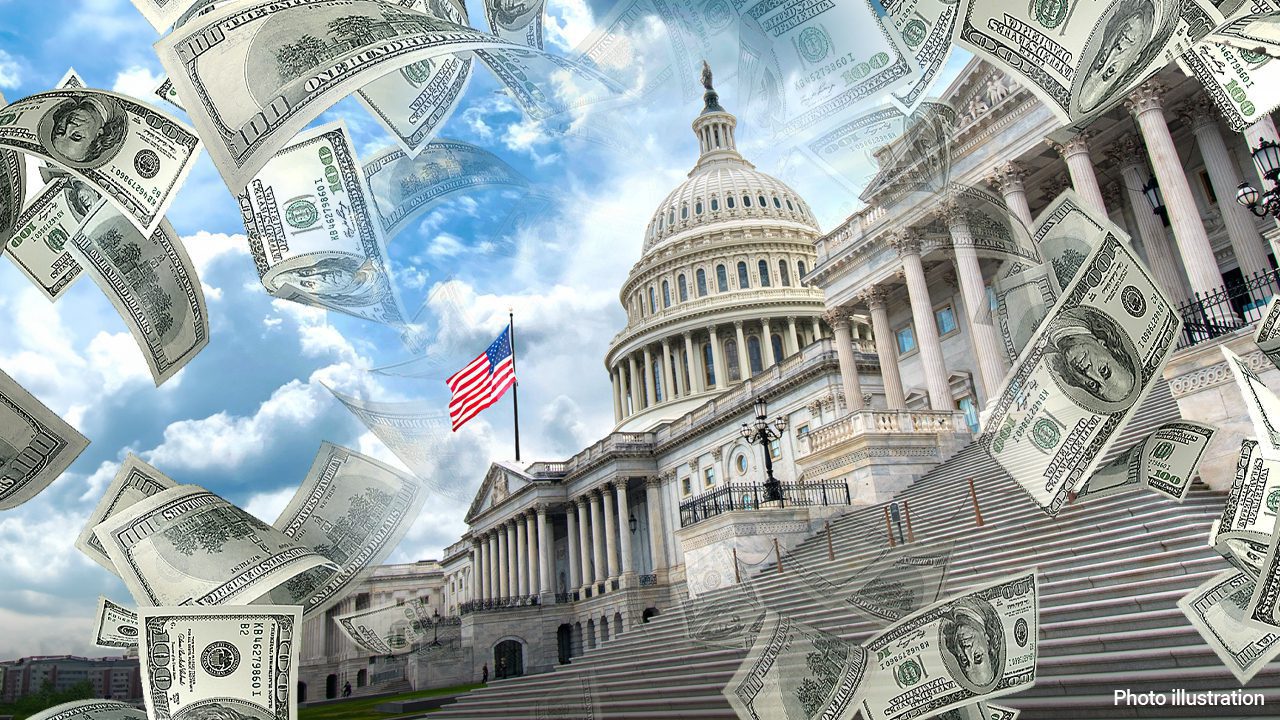The federal government is on pace to record one of the largest budget deficits in U.S. history this year when fiscal year 2024 concludes on Monday.
According to a June estimate by the nonpartisan Congressional Budget Office (CBO), the U.S. is projected to record a roughly $1.9 trillion deficit in FY2024 – which would rank as the third-largest deficit in U.S. history.
The CBO had previously projected a $1.5 trillion deficit for FY2024 in February, but updated its projection to increase the estimated deficit by about $400 billion to account for variations in economic conditions, including higher interest rates than previously projected that raised the cost of servicing the national debt.
With the national debt topping $35 trillion, there have been many fiscal years with large federal budget deficits and FY2024 will soon join those ranks. Here’s a look at the five largest federal budget deficits through FY2023.
The federal government ran a $1.375 trillion deficit in FY2022 as the U.S. continued to deal with the economic impact of the COVID pandemic and federal spending on relief programs continued.
Democrats and President Biden used the budget reconciliation process, which allows Congress to pass fiscal legislation on a simple majority vote, to enact the Inflation Reduction Act (IRA). The IRA contained a range of clean energy tax credits, prescription drug reforms, expanded health insurance subsidies under Obamacare while also imposing a corporate minimum tax, an excise tax on stock buybacks and increased IRS enforcement. The CBO estimated that on net it would reduce deficits by $238 billion over a decade.
Congress and the president also enacted the Infrastructure Investment and Jobs Act, also known as the Bipartisan Infrastructure Law, which the CBO estimated would add $256 billion to the deficit over a decade.
US NATIONAL DEBT HITS A NEW RECORD: $35 TRILLION
As the U.S. recovered from the financial crisis of 2007-2008 and the great recession that accompanied it, the federal government incurred a $1.412 trillion deficit in FY2009 – the largest in the country’s history at the time.
The CBO at the time noted that spending on a trio of programs contributed to the large deficit beyond the elevated spending on unemployment and other relief programs due to the recession.
Those programs included the Troubled Asset Relief Program (TARP), which was enacted the prior year to stabilize financial institutions and automakers, as well as cash infusions to federal mortgage agencies Fannie Mae and Freddie Mac. The American Recovery and Reinvestment Act, an $831 billion stimulus package enacted by the Democratic Congress and President Obama, also factored into the FY2009 deficit.
US NATIONAL DEBT TO SURGE TO RECORD LEVELS WITHOUT REFORM, RAISING PROSPECT OF DEBT CRISIS
A year ago, the federal government ran a $1.695 trillion deficit in FY2023 even as many relief programs enacted in response to the COVID pandemic were in the process of winding down or had been sunset.
Interest rates in FY2023 were significantly higher than they were the year before due to the Federal Reserve hiking rates to help tamp down inflation, which had peaked at a 40-year high of 9.1% in June 2022. Elevated interest rates caused the cost of servicing the national debt to rise by $177 billion, or 33%, compared to the year before.
BILLIONAIRE WARNS INTEREST ON DEBT TOPPING DEFENSE SPENDING A SIGN ‘THE COUNTRY IS IN TROUBLE’
The federal government ran a $2.775 trillion budget deficit in FY2021 amid the ongoing COVID pandemic as previously enacted relief programs continued and new spending was enacted.
Democrats and the Biden administration enacted the $1.9 trillion American Rescue Plan Act on party-line votes through the reconciliation process. At the time of its passage, the CBO projected the bill would add more than $1.8 trillion in deficits through 2030 – with over $1.1 trillion of that incurred in FY2021.
HARRIS’ ECONOMIC PLAN WOULD ADD OVER $1.7T TO NATIONAL DEBT: CRFB
The largest budget deficit in U.S. history was recorded in FY2020, when the federal government ran a whopping $3.132 trillion deficit amid a surge of spending on programs aimed at mitigating the impact of the COVID pandemic.
Several iterations of COVID relief bills were enacted by Congress on a bipartisan basis to help individuals and businesses, as well as state and local governments, weather the impact of the COVID pandemic.
GET FOX BUSINESS ON THE GO BY CLICKING HERE
The largest of those bills was the Coronavirus Aid, Relief, and Economic Security (CARES) Act – a $2.2 trillion stimulus bill that provided stimulus payments to most taxpayers, boosted unemployment benefits, the Paycheck Protection Program with forgivable loans for small businesses, plus loans for businesses in certain industries and aid to governments.
